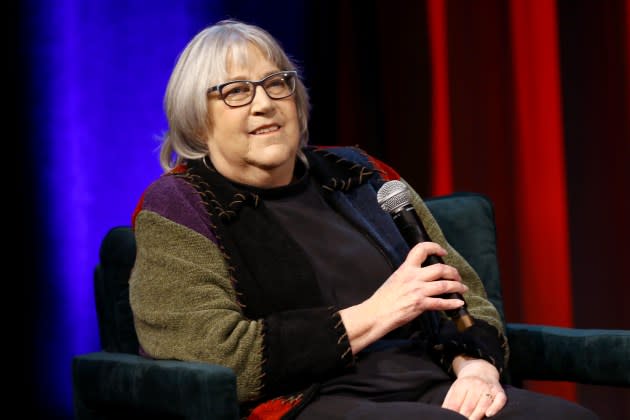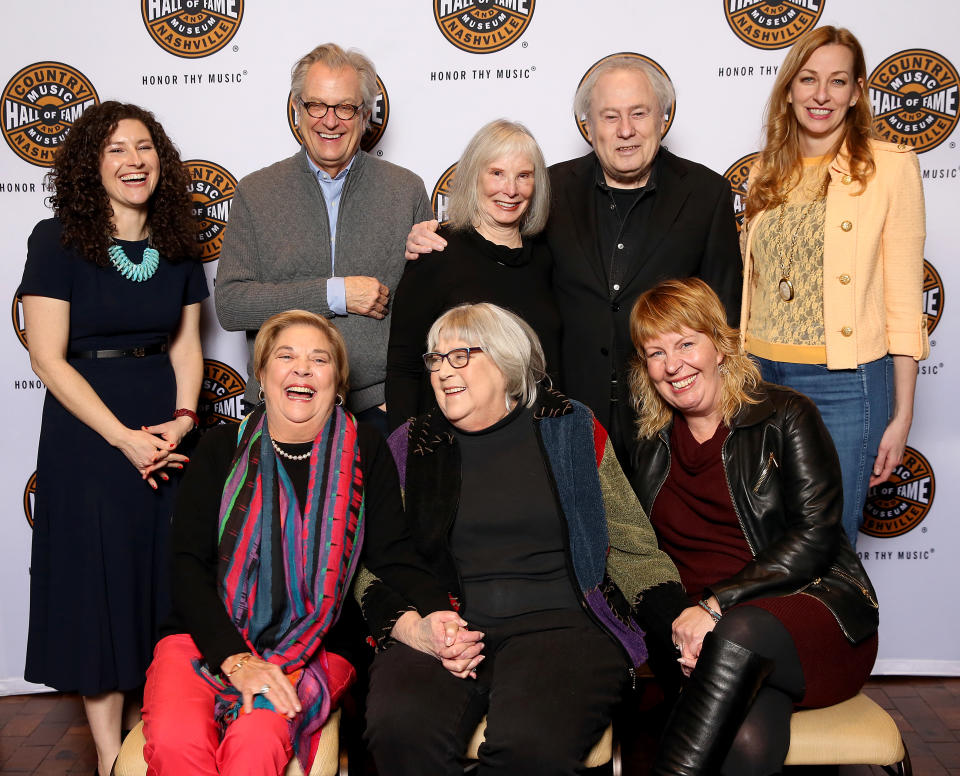Bev Paul, Exec Who Helped Turn Sugar Hill Records Into an Iconic Roots Music Brand, Dies at 76
- Oops!Something went wrong.Please try again later.

Bev Paul, who oversaw the Sugar Hill Records label as general manager as it became a staple of the modern roots music movement, died April 19 in Durham, North Carolina after a battle with lung cancer. She was 76.
Paul served as Sugar Hill’s GM through the 1990s and, after a brief stint in management, again in the 2000s. The label won more than a dozen Grammys in the bluegrass, country and folk fields, including honors for artists like Nickel Creek, Dolly Parton, Jerry Douglas and Tim O’Brien that recorded for the company under her watch. Other key artists she championed at the imprint included Sam Bush, Robert Earl Keen and Scott Miller.
More from Variety
Paul sat on the board of the International Bluegrass Association for multiple terms and was among the group of professionals that joined forces to found the Americana Music Association. In 2020, the Country Music Hall of Fame and Museum honored her for her contributions to the industry by selecting her as the subject of the annual Louise Scruggs Memorial Forum. (Watch the video of that forum with Paul here.)
A number of artists and execs spoke with Variety about Paul’s impact on their careers, the label or the roots world.
“Bev was my mentor,” says Traci Thomas, longtime manager for Jason Isbell. “She gave me a chance as a young publicist and changed my life. I wouldn’t be where I am today if it wasn’t for her. There’s also a whole group of industry folks that we like to refer to as the Sugar Hill gang that would probably tell you the same thing. She gave us all a chance and believed in us before we believed in ourselves.”
Holly Lowman, of Red Light Management, also credits Paul with instilling key principles in her as she began her career. “Bev Paul taught us how to listen, before anything else — image, a marketing plan, commercial appeal,” Lowman says. “If the music was great, if it was necessary, if it spoke to you, then we had a story to tell. The music always came first for Bev. Many of us from Sugar Hill are still making our way in the music business with this ethos as our North Star, and I hope we’ve made her proud.”
Says Tim O’Brien, who hired Paul as his manager between her stints at the label, “Bev was a benign presence at Sugar Hill Records. Her knack for coaxing possibilities out of the woodwork was her secret weapon. She wanted to make stuff happen and she just wanted to be around music. Bev was smart enough and generous enough to sort of make both the artists and the label happy. And she could let you know what the odds were, what you were up against in the record business, and then — yeah — also kind of help you beat some of those odds.”
Sam Bush, the mandolinist and progressive bluegrass pioneer whose recordings with Sugar Hill stretched from the mid-’80s to the mid-2000s, addressed Paul directly in a statement of affection. “Bev, you were a captain in shaping the marketing direction for New Grass Revival and later my Sugar Hill solo records, with your passion for the music and attention to detail,” Bush says. “We couldn’t ask for a more understanding professional advocate and, above all, a better friend. You’ll be forever in our heart and always in our memories.”
Barry Poss, the founder and owner of Sugar Hill, conveys a distinct memory of his first meeting in 1991 with the woman who would become one of his key hires. “When Bev Paul interviewed for the marketing director position at Sugar Hill Records, I said hello, and she promptly proceeded to lay out in explicit detail why I needed to hire her,” Poss recalls. “I didn’t ask a single question and, as with many things about Bev, it was a no-fuss, no-muss display and right on target. She learned the business, worked her way up to general manager, and we all flourished together, in no small measure due to the reasons she laid out in the original interview.”
Molly Nagel Driessen, now with the Nashville management and marketing company MMgt, spent 12 years moving up through the ranks at Sugar Hill, starting in the mailroom and ending as manager of the label’s Nashville office and staff. She says, “I was one of many young ‘uns that Bev Paul tucked under her mighty wing. She was a veritable force who brought a deep love for music and a dedication to artists to work every day, and centered them in every decision. At the time I didn’t know what a feat that was. She was also fiercely loyal to her people, fostering and identifying young talents on her team and raising them up. I was incredibly fortunate to have her as a mentor and protector, to make mistakes under her measured gaze, and to look up and see this powerful woman cracking ceilings above me.
“Her legacy really can’t be overstated in our little corner of the industry, and I see it and am thankful for it every day. She was really a titan,” Nagel Driessen adds. “I hope she’s up there smoking one with Guy Clark, looking down at the mess and having a laugh.”

O’Brien worked with Paul more extensively than many, as he had her as the first manager he ever hired, when she left Sugar Hill for a brief period after it was sold in the late ’90s before she came back on board, serving as a boon to his career in all those eras and capacities. He credits her for his Grammy win: “I had this record, ‘Fiddler’s Green,’ that came out and she situated it in such a way that it actually got on the Grammy ballot and actually somehow won against some pretty heavy odds.”
The barriers between fan, friend and exec did not apply with Paul, O’Brien says. “She wanted to be around the music and came to be friends with a lot of the musicians. That’s the way Sugar Hill was anyway, but Bev was hands-on with the artists more than some of the employees. Of course we’d play in North Carolina (where the label was based) a lot and I’d see her there, but she’d come around to Nashville, too, and out to some other events that I played around the country. She was working in a marginal side of the popular entertainment (strata) — I mean, it is popular music, but not as popular as, you know, pop music — but she just loved the music. And she would go around to the various venues and go to festivals and things and check out what was happening there and who was listening, as well as who was playing, and see how it was working, so that she could try to fit you in somewhere and help you find those avenues where maybe you could make a go of it.
“We all loved a lot of stuff, a lot of music,” O’Brien continues, “and we would sit around after the gigs and have a few drinks or smoke something, and then talk about all the music that we liked. Ricky Skaggs had left the label and gone on to major success, but then, new people like Robert Earl Keen would come in, and they’d get excited by that. It was a small shop and everybody there was really interested in the music. I’m sure it was a good job because they were interested in the music, the people that worked there, but it probably wasn’t the best-paying job anybody could get. If you weren’t into the music, it probably wouldn’t have appealed. Rounder (Sugar Hill’s closest competitor) had gotten bigger, but she followed the heart of what she liked, found that this label here was putting stuff out she liked, and then she helped it become even more like what she liked, you know?
“I’m sure anyone in the business is looking to have a plus side on the ledgers and make some money, and I suppose you can hope to make a lot of money somewhere, but mostly they were happy with getting the scene going —there was a scene already going and they really expanded it. Barry, the founder of Sugar Hill, had a vision for it, that it was musicians that had one foot in tradition and one foot moving forward with it. And if you look at the artists that they signed, some of ’em had recorded for majors before and they fell back to an independent, but others were new artists who really went on to a lot of success” — including Keen, whom O’Brien cites as one of the edgier singer-songwriters on the scene that he found she naturally gravitated toward. “And it’s due to people like Bev that made it happen.”
Paul spent her childhood in Bethlehem, Pennsylvania, but was said to have fallen in love with the South when she took a trip with her father to his Duke University class reunion in Durham. She moved there for college, getting to have some of her earliest music industry experiences in a campus folk music coffeehouse on campus, followed by a stint working at the Gaslight Cafe in Fayetteville, NC. Moving to the Raleigh-Durham area, she joined radio station WQDR and worked at the home office of the Record Bar, a national music retailer, where she got to know emerging talents like the Judds and Alan Jackson before they broke big.
That time she spent in Raleigh-Durham prior to joining Sugar Hill in 1991 was also when she met her husband-to-be, Bobby Paul, who survives her.
Jed Hilly, current executive director of the Americana Music Association, who came on after the founding of the organization, salutes Paul’s role as one of the forces who made it happen, along with her greater legacy in music. “Bev Paul was a fearless advocate for the artists we love, and they loved her,” he says. “Her passing came too soon.”
In lieu of flowers, Paul’s family has asked that friends donate to the V Foundation for Cancer Research at http://www.v.org, and/or “please support live, local musicians and artists.”
xx
Best of Variety
Sign up for Variety’s Newsletter. For the latest news, follow us on Facebook, Twitter, and Instagram.

